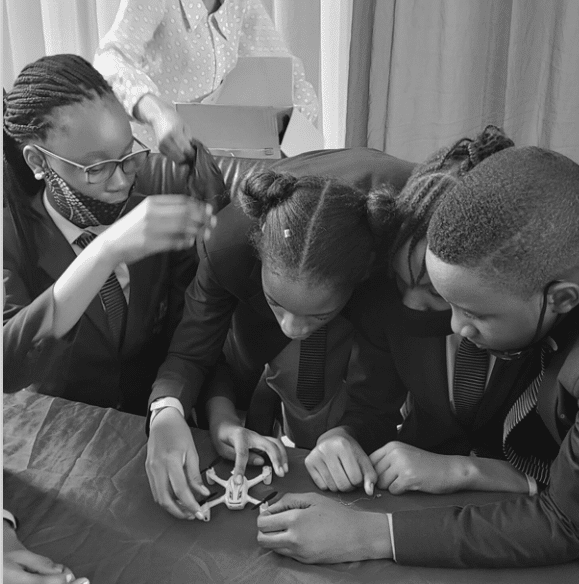Contest provides young Nigerian entrepreneurs inspiration, education to help Africa fly toward drone-enabled future
May 18, 2021

Public safety. Healthcare. Hunger. These were among the humanitarian challenges that young entrepreneurs targeted recently – perhaps even more passionately than profits – in the 2021 Nigerian Drone Business Competition.
Almost 1,000 aspiring business leaders, ages 16 to 30, entered the contest, representing every state in Africa’s largest nation. The turnout stunned planners, who had feared that a pandemic-necessitated shift from an in-person to a virtual event would stunt participation.
“That just kind of shows you the entrepreneurial spirit that is here in Nigeria,” said Eno Umoh, primary organizer of the competition. “There is a lot of interest in drone technology here, and we want to harness that.”
Umoh is co-founder of the Global Air Drone Academy, a nonprofit based in his hometown of Baltimore, Md., that is working to broaden access to drone education worldwide. Since 2016, GADA has conducted trainings for more than 6,000 students in nine countries, and in 2020 the organization won a £20,000 entrepreneurship grant through the African Drone Forum to set up an African headquarters in Lagos, Nigeria’s most populous city.
Umoh, whose father is from Nigeria, was quick to point out with pride: More than a third of the entries in the 2020 contest, which was open to all of Africa, came from Nigeria.
GADA has done other outreach in Africa, but the virtual competition in January was its first big event organized from the new Lagos office and its first to focus entirely on Nigeria. The event included a five-day boot camp during which 30 finalists heard from industry experts, learned about diverse use cases for drones, and received coaching from a panel of judges to hone their business pitches. There was also a one-day workshop for those who didn’t make it to the finals.
“We were so impressed, so impressed, with the number of applications that we knew we must do something to keep the interest going with the larger group,” said Ibrahim Aliyu, programs officer with the U.S. Consulate General in Lagos. The consulate funded the contest as part of its diplomatic mission to help Nigeria tap into both the economic opportunities and problem-solving potential of STEM in general and unmanned technologies specifically.
“A contest might seem small,” Aliyu said, “but the drone industry is just taking off here, and starting small with an exchange of ideas like this can have a far-reaching impact.
“Sometimes you need to give young people something that is concrete so they can see and feel, you know, why are they doing STEM? Something like drone technology, drone business, is real. They can see a future. They can link what they are studying today to what they might become tomorrow.”
Starting small, thinking big
What might the winners of the Nigerian Drone Business Academy become tomorrow? The answers in their pitches suggested as much desire to help their country as to benefit themselves.
First-place winner Mary-Brenda Akoda, for example, envisioned a business called Drone ER (Emergency Response) using drones to catch kidnappers.
Nigeria is confronting an abduction epidemic, with thousands of people taken each year. Akoda, a 23-year-old computer science student at the University of London, described an acute sense of helplessness in her hometown of Calabar in southern Nigeria’s Cross River State.
Drone ER, Akoda explained, would provide search services for families – deploying drones equipped with thermal-imaging capabilities, among other sensors, to scan suspected hideouts from a safe distance, and enabling operators to alert law enforcement of any findings.
Akoda, a graduate of the prestigious African Leadership Academy in South Africa, noted that while hiring out search drones might seem far-fetched, other once-seemingly outlandish uses for unmanned aircraft have become commonplace in recent years.
“Rephrasing a quote by Napoleon Hill,” Akoda said, “… Whatever the mind can conceive and believe, it is possible to use drones to achieve.”
Second-place winner Dr. Imodoye Abioro, a 26-year-old physician, proposed using drones to tackle another national issue: the need for blood.
Fifty-two of 54 African nations face severe blood shortages, the 26-year-old physician told competition judges. But Abioro’s inspiration runs deeper than statistics. In 2017, while still training at University College Hospital in Ibadan, he watched helplessly as his best friend died of a leg laceration.
“Try as we might,” Abioro recalled, “we couldn’t get the blood he needed.”
The tragedy gave rise to Lend an Arm, a company Abioro built to expedite blood delivery. He started by designing a smartphone app that currently enables automated searches of blood banks and then delivery of the nearest matches by motorcycle. Abioro entered the business competition with hope of switching to drones, which could bypass rural roads that are often otherwise impassable.
“We began to think, ‘Drones would be a great improvement,’ but basically my team was just toying with the idea,’” Abioro said. “This contest was a wonderful opportunity to truly explore the possibility and speak with experts I never would have had access to otherwise. Now we feel certain we will implement (drones) this year. It was a seismic shift for us.”
Hunger was 23-year-old Daniel Alayande’s target. He placed third with a business idea called FarmerTech.
Alayande’s pitch emphasized that Nigeria’s population is growing fast. It is expected to double to more than 400 million by 2050, which would make Nigeria the third-most populous country in the world. Many fear agricultural yields will fall further and further behind the need for food.
Through FarmerTech, Alayande wants to dispatch sensor-loaded copter drones to gather data that farmers can use to plot irrigation routes, monitor growth, and plan the strategic use of pesticides, herbicides, and fertilizer. He also wants to offer fixed-wing drones to automate spraying, cutting manual labor hours and human exposure to toxic chemicals. Finally, he wants to offer a cloud-based data-management system that would enable farmers to keep constant tabs on the information gathered.
“The more I dug in, the more I got to understand that IoT sensors could help the farmer to make data-driven decisions,” said Alayande, whose research included visiting farms, consulting agronomists, and watching YouTube videos on drone-assisted agriculture in other countries. “And when a farm is data-driven, that’s when it can be profitable.”
Challenges and next steps
Each of the top three won a DJI Mavic Mini 2 drone, business coaching and mentorship from GADA through the Nigerian Civil Aviation Authority’s licensing process, and admission into an entrepreneurship course with Poise Nigeria.
“It definitely doesn’t end with the competition,” said Umoh. “We truly want these ideas to come to fruition. That’s what this is about – opening up opportunities for people that weren’t there before.”
Another benefit of the competition and other GADA outreach lies in the opportunity to focus attention on the good that can be done with unmanned technologies.
“Sometimes when government officials think of drones, they think of security issues, and the negative ways that they can be used,” he said. “That is honestly part of the reason we are here. Events like these … enable us to communicate with officials at different levels about the different issues and problems in a very positive way.”
- Industry News


